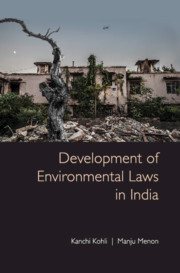Book contents
- Frontmatter
- Contents
- List of Tables
- Preface
- Acknowledgements
- Introduction: Environmental Laws and Development in India
- 1 Fundamentals of Environmental Law
- 2 Institutions Regulating India’s Environment
- 3 Forest Reservation and Conservation
- 4 Pollution Control and Prevention
- 5 Environmental Protection
- 6 Wildlife and Biodiversity Conservation
- 7 Ground and Surface Water Extraction
- 8 Land Acquisition
- 9 Climate Litigation and Policy Frameworks
- 10 Contemporary Environmental Law Reforms
- Index of Laws, Legal Cases and Government and Parliamentary Committee Reports
- General Index
10 - Contemporary Environmental Law Reforms
Published online by Cambridge University Press: 31 July 2021
- Frontmatter
- Contents
- List of Tables
- Preface
- Acknowledgements
- Introduction: Environmental Laws and Development in India
- 1 Fundamentals of Environmental Law
- 2 Institutions Regulating India’s Environment
- 3 Forest Reservation and Conservation
- 4 Pollution Control and Prevention
- 5 Environmental Protection
- 6 Wildlife and Biodiversity Conservation
- 7 Ground and Surface Water Extraction
- 8 Land Acquisition
- 9 Climate Litigation and Policy Frameworks
- 10 Contemporary Environmental Law Reforms
- Index of Laws, Legal Cases and Government and Parliamentary Committee Reports
- General Index
Summary
INTRODUCTION
Indian environmental laws have seen tremendous changes since the 2000s. The predominant goal of successive governments in India has been to enhance economic growth, to provision for the needs of India's large population and to manage the global and local expectations of sustainable development. In order to achieve these goals, the central government has undertaken consistent and systematic processes to review and overhaul several environmental laws in the country and to streamline them with these governmental objectives. Amendments to environmental laws have also been brought on by court directions and parliamentary committee reviews. The erstwhile Planning Commission and the present-day NITI (National Institution for Transforming India) Aayog have also played a decisive role in recommending policy and legal changes. Citizen engagement with environment laws has also increased during this period due to the creation of specialised legal forums and information availability. They have litigated on violations of law and demanded accountability from regulatory institutions. The nature, scope and role of environmental regulation have undergone major shifts as courts, civil society and social movements are focused on the effects of environmental laws on the ecology, economy and society.
By the early 2000s, environmental scrutiny of most infrastructures, energy and real estate projects was a legal prerequisite. One set of pressures for amendments and revisions to environmental laws has come through an ‘investment reforms’ agenda. The primary mandate of these reforms was to reconcile environmental law frameworks with economic priorities such as expanding opportunities for international investments and growth of domestic businesses. The environmental law reform proposals in this phase were driven by the narratives that environment regulation caused delays, bottlenecks and hurdles for much needed investments. These reforms were executed through setting up of high-level committees by ministries such as coal, commerce, power and finance. These special committees also carried out consultations across ministries at the state and central levels and with economic actors such as corporations and industrial and investor associations.
Another set of changes came through courts and governments interested in finding solutions for the implementation challenges faced by environmental laws and regulations. Courts, the central government and various state governments suggested legal and policy changes to institute long-term monitoring committees, financial offset mechanisms, and grievance redressal and appellate mechanisms.
- Type
- Chapter
- Information
- Development of Environmental Laws in India , pp. 319 - 334Publisher: Cambridge University PressPrint publication year: 2021



